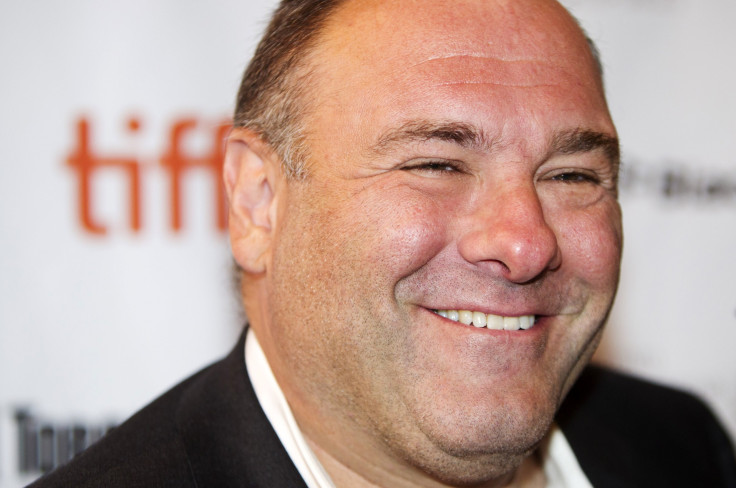The Death Of Tony Soprano... Uh, I Mean, James Gandolfini

The stunning news out of Rome, Italy, last week that actor James Gandolfini had died from a heart attack elicited widespread shock and sorrow from millions of fans of the landmark HBO mafia drama-comedy series, "The Sopranos."
Gandolfini, who brilliantly played conflicted North Jersey mob boss Tony Soprano, became a reluctant superstar, while his alter ego ascended to the realms of pop culture icon.
"The Sopranos," created by David Chase (born DeCesare), is not only one of the greatest television programs in history but a genuine work of art, equal in value to almost any cinematic or even literary masterpiece.
However, as my colleague Ellen Killoran perceptively asked last week: "Who were we (the fans) really mourning? Gandolfini (whom most of us had never met nor really know much about) or the fictional Tony Soprano (whom we also never "met" but nonetheless knew very well and also loved)?"
As Ellen noted, we (the fans) identified Gandolfini so strongly and inexorably with Soprano that we have conflated the two in our consciousness -- we neither know, nor care, where one ended and the other began.
But this is normal for TV and film actors whose performances are so compelling and moving that they cannot separate themselves from their screen doppelgangers -- no matter what else they did, Jackie Gleason is forever Brooklyn bus driver Ralph Kramden, Marlon Brando is still brutish Stanley Kowalski (or perhaps Vito Corleone), and Carroll O'Connor is permanently Archie Bunker.
As for Gandolfini, he was reportedly ambivalent about his success and even resented how the public's embrace and fascination with Soprano intruded into his real life. However, as Gandolfini surely must have realized, that was the price of his huge success.
The stellar qualities of "The Sopranos" have been detailed and explored by hundreds of other critics and observers, so I shall not repeat what they have said about the show.
But allow me to discuss what I found so gripping about Soprano, his crime family of murderers, extortionists and arsonists, and his needy, selfish, materialistic nuclear family.
Unlike "Goodfellas," "Donnie Brasco" and several other cinematic creations, "The Sopranos" was not really about La Cosa Nostra. Rather, it depicted the slow, painful decline of American society from a manufacturing, military superpower into a fractured, decaying second-rate nation filled with overweight, under-educated, uncultured and spoiled materialists hanging onto their class delusions.
Of course, on a superficial level, "The Sopranos" could be easily enjoyed as a mob melodrama. (What criminal deals are they cooking up? Who's getting whacked this week? Who will betray Soprano? What will Soprano do with this gumar?, etc.)
But those people missed the larger themes (as Soprano himself once advised his unstable nephew, Christopher Moltisanti: “Look at the big f---in' picture!”).
I think Chase cleverly used the format of an Italian mafia saga -- an extremely popular genre -- to lure his viewers in. But, in the meantime, he disposed of all the familiar clichés of gangster films and instead gave the public an incredibly vivid, complex and devastating portrait of U.S. society at the close of the 20th century.
Naturally, if Soprano worked as an accountant or a truck driver (and had similar problems and conflicts), the show would not nearly be as entertaining nor interesting.
Moreover, the very heart of the show focused on the dual, and apparently unassimilable, nature of Soprano's life -- that of a violent mobster and loving husband and father with a spiritual crisis of sorts that prompted him to seek psychiatric help and created endless dramatic possibilities.
By portraying all aspects of Soprano's existence, we were treated to a bewildering array of fascinating and puzzling scenarios: for example, Moltisanti's obsession with movies and dreams of becoming a filmmaker, when he can barely read nor write; Richie Aprile, one of the most psychotic gangsters of all and his fondness for practicing yoga; Uncle Junior's fears of aging; Janice Soprano's flirtations with New Age philosophies; Bobby Bacala, the gentle monogamous soul who liked playing with his Lionel toy train sets; and "Big Pussy" Bompensiero, the hitman who worried about paying for his sons' college educations.
Chase, who remained free of any censorship since the show did not appear on a broadcast network, could indulge in violence, profanity and nudity but never gratuitously or for the purposes of titillation. People got naked, had sex, cursed, lied, cheated, drank, took drugs, beat up people and even committed murder -- just like in the real life of mobsters.
More importantly, Chase used the fictional Sopranos to skewer the pretensions and delusions of the suburban upper-middle class -- Soprano lived in a tacky, McMansion with a backyard pool and fancied himself a “successful businessman.” His long-suffering wife, Carmella, regarded herself as a classy, stylish woman of substance and Catholic morality, while attempting in vain to ignore how her husband earns his money and his numerous extra-marital affairs (while conducting her own). Soprano's very spoiled daughter, Meadow (who evinces no delusions about her father's "profession"), nonetheless pretends she is not materialistic and expresses her concerns for society's underclass and have-nots.
And no mafia show has ever before clearly depicted how mobsters and their families deal with the familiar, mundane items of daily life before. Indeed, the "Sopranos" scripts were filled with references to such subjects as the Internet, TV reality shows, medical advances, 9-11 terror attacks, real-life political figures, the rising cost of tuition, immigration and, of course, psychotherapy.
In the final analysis, Chase created a masterpiece as rich, deep and complex as any 19th-century Russian novel, while Gandolfini, may he rest in peace, will forever be remembered as Tony Soprano, a fat, bald gangster that we intermittently loved, hated, feared and sympathized with.
© Copyright IBTimes 2024. All rights reserved.











